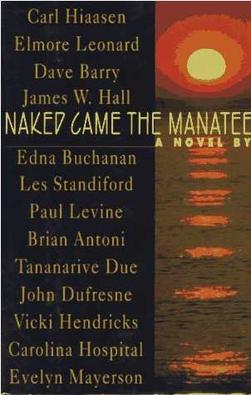 In 1995, crime writers Edna Buchanan, Vicki Hendricks, Elmore Leonard, Paul Levine, and Les Standiford and eight of their writing colleagues penned the round-robin mystery novel Naked Came the Manatee. Conceives as a parody of the thriller genre and a response to an earlier multi-author novel titled Naked Came the Stranger (which has 24 writers!), Manatee originally appeared as 13 installments published in Tropic Magazine (a Sunday supplement to the Miami Herald).
In 1995, crime writers Edna Buchanan, Vicki Hendricks, Elmore Leonard, Paul Levine, and Les Standiford and eight of their writing colleagues penned the round-robin mystery novel Naked Came the Manatee. Conceives as a parody of the thriller genre and a response to an earlier multi-author novel titled Naked Came the Stranger (which has 24 writers!), Manatee originally appeared as 13 installments published in Tropic Magazine (a Sunday supplement to the Miami Herald).
The plot centers on three fictional sleuths ( Les Standiford’s John Deal, Paul Levine’s Jake Lassiter, and Edna Buchanan’s Britt Montero) who team up to solve the mystery of a package delivered by a manatee.
In an interview with Barbara Peters, founder of the Poisoned Pen Press and Bookstore, author Dave Barry tells how he wrote the first chapter and then passed it on to Tropic editor Tom Shroder.
Shroder then passed it on to other writers, and each in turn built upon the tale before Carl Hiaasen stepped in to tie it all together in a final chapter.
In this way, the composition process resembles the one followed by the New Towne Players as they develop the story of the plot against Tim Vetchi (aka The Victim) in the Act V of Prime Stage Mystery Theatre’s “A Most Deadly Poison” (which you can hear by clicking the player below).
 Not surprisingly, the round-robin process has become a favorite among writing groups and teachers.
Not surprisingly, the round-robin process has become a favorite among writing groups and teachers.
While teaching at the University of Oregon, novelist Ken Kesey developed the exercise into the novel Caverns, about a convicted murderer who leads an expedition to a secret cave in Utah. The 14-author exercise was published in 1989.
I too had good success with the process back in the days when I was teaching Writing Popular Fiction at Seton Hill University. It’s a great way to get ideas flowing, and it’s fun seeing the kinds of stories that spring from even the simplest premise.
If you’re part of a writing group or classroom, consider giving it a try. To get you started, the National Council of Teachers of English (NCTE) has an article titled “Round-Robin Oral Storytelling.” I can’t guarantee a published novel will result, but you’re likely to discover–as August LaFleur says in Mystery Theatre–that “stories are everywhere.”
Click play. I’ll meet you there.


Leave a Reply